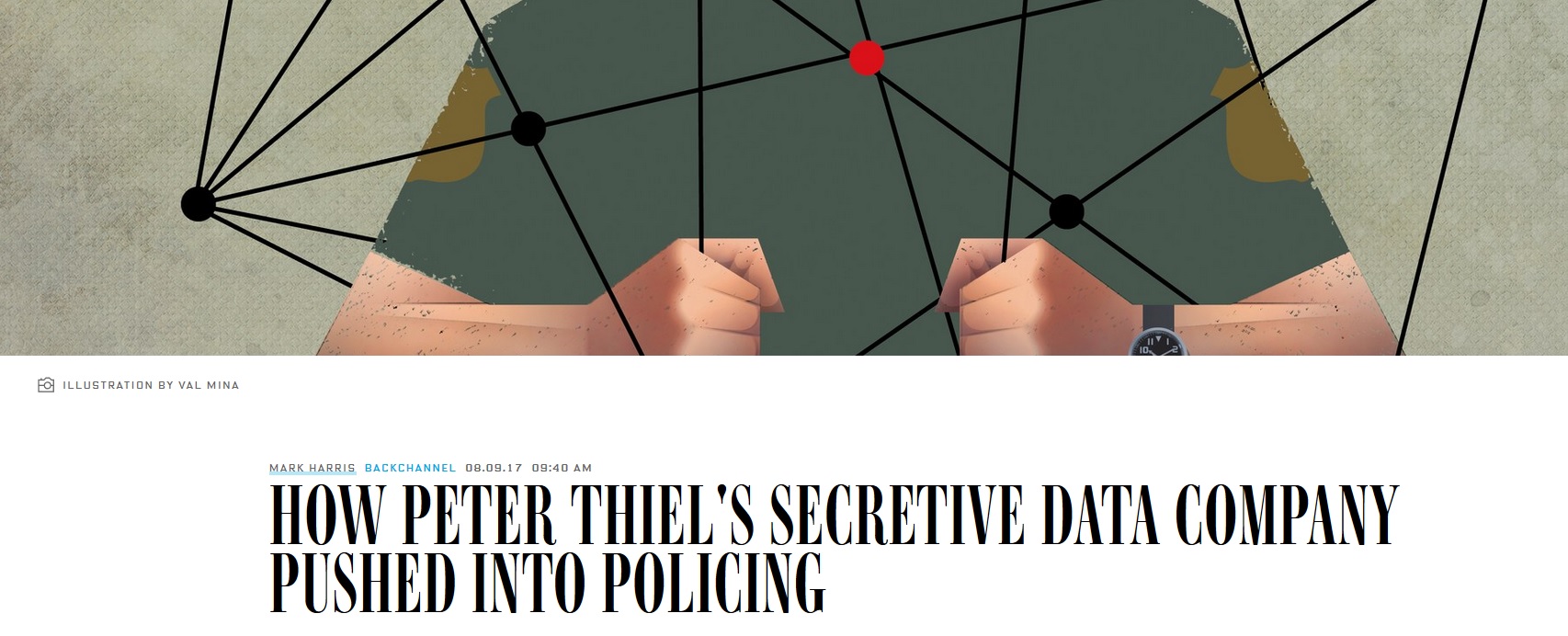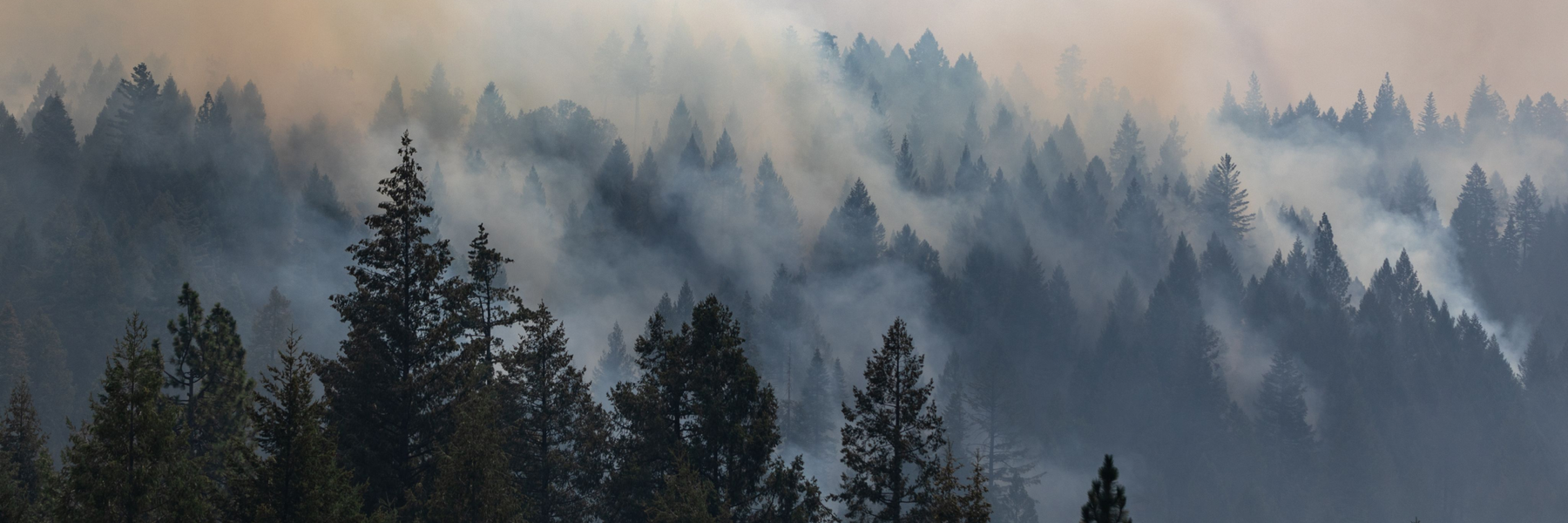
Mark Harris was getting tired of consumer reporting when he found a way to get great scoops to literally come right to him: Freedom of Information requests. Here our inaugural MuckRock Thiel Fellow shares the tips and tactics that helped him pierce the secrecy around Palantir and dig into other secretive tech companies.
Recently you had another great story, detailing how a new religion was being founded in Silicon Valley by Anthony Levandowski. Was that a public records story? Or just a public data story?
Well, I’ve been following Levandowski for a long time, and I’ve had a lot of success working with public documents on self-driving cars, generally. I first found out about him through a public records request. Google was testing it’s self-driving car in Nevada and it actually did the world’s first self-driving test, where a driving examiner got into the car and it did it’s stuff, and he ticked it off, just like he would … you know, with a clipboard and a little … you know, “A bit hesitant at intersections.”
I thought that was really interesting, so I requested a lot of documents around that and wrote some stories around that. I discovered the connection of Levandowski … I didn’t even know that Google had bought this startup. Nobody did, that they had bought this startup that Levandowski had founded, that actually had a lot of the early technology for self-driving cars. That kind of gave me the insight into this guy, and I was interested in, wow, so Google didn’t invent the self-driving car, it just bought the expertise.
I started following him over the years at Google and then particularly at Otto, the self-driving truck startup. I found that a very interesting company because it burst onto the scene and it did a lot of stuff very quickly. In retrospect, that now seems obvious.

They were trying to prove their value to Uber, but at the time it was just, “Wow, wait a second” … I realized from looking at their demo video, that they hadn’t gone through the legal regulations in Nevada to operate or even test autonomous vehicles. And so I did some records requests around that and found out that indeed they hadn’t, and Nevada authorities had called the test illegal and were very angry at him.
And then on the basis of that story, Google, or now Waymo, its self-driving car spinoff, after my records requests from Nevada … they said, “Oh, we did this records request and we put this case together and found out that Levandowski was stealing our secrets,” or that’s what they alleged. I was just like, “Oh, I wonder what records requests they did.” So I did a records request to find out what their records request was, and their records request was for my records. It was all this big circle of records request.
But actually, it turns out they then found in some of the documents that I had got from Nevada, that there was this interesting technical information that seemed to confirm to Waymo that Uber, via Otto, was actually using its technology. Obviously, I didn’t know that when I got the requests but it was in there in the documents. They called that the final piece of the puzzle that allowed them to file the lawsuit.
I was kind of front row of that whole Levandowski and Waymo/Uber legal kerfuffle; it’s still ongoing. And as that’s proceeded I’ve just kept on top of the court findings; I have some good stories there, just by crunching through those and finding things that were misfiled or poorly redacted or just joining the dots really, because I have a lot of good background knowledge on the subject.
I also just did a real effort during this profile piece to find out every single company that Levandowski was involved with. As part of that, I found out he’d founded a religion in 2015 that was still active earlier this year, and wants to build an AI that will become a god, that he will then worship for the betterment of humanity, which is eye-opening stuff.
Absolutely. So that was a religious filing in California that led you to that?
That’s right. It was a database story, really. They have a pretty good database there, if you know how to parse it. It’s all a question of knowing how to query databases properly and going down a lot of blind alleyways, and either searching all addresses, searching all the people, searching on misspelled addresses, all the kind of normal things that we have when we’re working with public data. It’s very rarely in the perfect format and it’s very rarely filed in the right place at the right time. So you have to try and work around all of those problems. And the easiest way to do that I find is just do a bunch of queries on the databases, and as many databases as possible, and then cross-reference them and try be as complete as possible.
Yeah, so I found that through his lawyer. So finding out all the companies that his lawyer had founded or from his lawyer’s address, and then you can start to work back up the tree and find out all the companies and corporations. This was a religious corporation that he was involved with.
I’ve followed your work for years; you always seem to have really brilliant requests that kind of dig into stuff from a different angle than other people know to look for. How did you build that process?
I think it’s totally trial and error. I honestly don’t know if there’s another way of doing it. I’d like to say I had this embroidered on the wall, “Always be filing;” I don’t but I do try and keep that in mind. If I have a quiet time between stories, I’ve got one right now, it’s like, great, this is a good time to just file a bunch of requests.
And it’s kind of just use best skill and judgment. I’ll often focus on one jurisdiction if I think there’s something interesting happening there, and then I’ll file a number of requests relating to companies or individuals working there. Or I might be focused on a company, and then I’ll do multiple jurisdictions and agencies where I think they may be operating or may have some connection.
And then obviously, there’s probably a news story when there’s a press release saying, “Oh, so and so company has just announced that it’s doing something in this place.” And I was like, “Okay, well let’s just see how that process went for them. Let’s just file and see how their interactions with regulators or officials there progressed.” Often, everyone was very nice and everything worked well and there’s absolutely nothing newsworthy that happened there. And then of course, once in a while, there’s something that … the start of a thread that you can then follow and explore. Once you’ve got that lead, then you can use other databases and approach sources and do all the normal mechanics of story telling.
How did you first get into public records? Was there something that sparked your interest in the first place?
I was doing pretty much consumer electronics, consumer journalism, I would call it, business consumer journalism, for a long time. I was writing about gadgets, I was writing about hardware, new iPhones and all that kind of stuff. I got a bit bored with that, and I saw a news story about defibrillators, you know, the defibrillators you see in airports that you can use to shock people if they have a sudden cardiac arrest, and certain type cardiac events can prove fatal … if not treated very quickly. That’s why we see them in airports.
Who knows why I was, but I was browsing some website, and it was a press release out of the FDA, the Food and Drug Administration, that there are some problems with defibrillators. It was quite a shocking number … this was 2011 I think, I can’t quite remember now. There was a huge recall of large numbers of these defibrillators that weren’t working, and they were talking about systemic problems with them.
So that’s really the first time I really got into the databases there. I got into the database and really looked at the FDA reports, and did some fairly rudimentary data analysis on them. That kind of opened up the story there, where I did an investigation about how and why these are failing. Some of it was design flaws, some of it was just lazy companies not updating software or hardware, and some of it seemed to be almost negligent on their part.
It was quite a nice story, and that got me thinking about databases. That story helped me get a MIT Knight Science Journalism fellowship. And then I was exposed to a lot of other journalists from science and other areas. I could see them doing records requests. I heard about them doing records requests, and I was like, “You know what, I can really do this. I’d done one or two really good stories, why don’t I spend a bit more time on that.” And then coming out of that, it was basically a year where you don’t work … coming out of that in 2014, I said, “Right, I’m just going to get interested in public records requests.” As I found out, they’re free to file. Sometimes you get charged for them for the results, sometimes you don’t. At the start, I kind of just ignored anything that wanted money. I just filed a bunch, and then I started getting stories out of it.
When you’re filing all these requests, do you have a strategy? Do you often appeal, if an agency comes back to you? Or is there kind of just sort of looking for low-hanging fruit, until start finding something worth chasing?
That’s a good point. I don’t often appeal. My experience has been that agencies are either responsive and helpful and are invested in the process and will help you to fulfill [or not].
As a lone freelancer, I just have to be a bit ruthless about my own time and how much time I can justify spending on each individual request, when I have often I only have a few handful of requests, but each of them do require some work to stay on top of and analyze and to think about. If you start spending too much time on a single request, unless you’re sure there’s a pot of gold at the end of the rainbow, it’s just not worth my time to follow those up. As much as I’d like to.
Can you talk about the conjunction of using FOIA requests with interviews? Or any strategies for using public records to help out other aspects of your reporting?
I think it, primarily, gives you credibility. If you’re trying to interview people at the agency you’re getting data from, and you’ve got to that point, you’ve got some data, you’ve got some information. They are working from the position that you know something newsworthy, and it’s really in their interests to talk to you. It gives you more leverage to get a better interview, if you have some data before you go into that interview. Whether you’re trying to get more data on top of what you’ve already got, or merely an explanation of it, it still gives you far more leverage, far more ammunition, in order to get a better interview.
If you’re trying to get interviews outside it, then again, hinting at the information or revealing some of that information, if you’re careful about it, to some of the people that you’re interviewing, again, gives you credibility. Sometimes you can make it look as though you know more than you do, without lying to people. Or perhaps you need some more sourcing, or you need some clarification or an opinion on the information. It can help you in your dealings with other people. It really just gives you a firmer basis to carry out interviews. It gives you a firmer basis for your story. The more solid the ground you’re working on for a story, obviously the better your story will be ultimately, and the better questions you can ask … You get to ask yourself how much information is enough to go into the interview with, and there’s obviously no good answer to that. You just have to work with your deadlines and your own opinion about whether it’s worth waiting for more results before you push on.
Any advice for people getting into public records?
Yeah, I think it’s almost always better to do short snappy requests, especially to start with. It’s so easy to get bogged down in longer requests. You can put a wishlist of everything you want as a request, and that’s just more likely it’s going to get stuck in a complex queue, where people are going to have to spend more time on it; they can often delay getting anything back at all. I tend to be more incremental … I’ll do a request, and if there’s something interesting there then you can always do another request. That obviously works better if you have a longer deadline, but I think that’s really the best way to start.
So do that short, snappy request, because then you can go in and do another one, perhaps with slightly better wording.
It’s tempting, sometimes, to feel guilty about filing a number of requests with the same agency, but don’t, that’s their job. It’s our data, it’s our information that you’re trying to get hold of. You should try and make it easy for them to give you that information, and that can often mean short requests. But do file them with multiple agencies.
Any other advice for people interested in using public records?
I think it’s good way to get ideas for stories as well. If you’ve got a rough idea, and you’re a long way from having anything ready to publish, just send out a few requests and see what comes back. It might change the direction of your story.
Always try and be thinking about stuff that other people aren’t interested in. That’s my biggest advice for stories anyway, particularly if you’re in a smaller news organization or a freelance.
Lots of people are covering the big companies and the big topics. If you can focus on other ones, you’ll also find companies and agencies that haven’t dealt with public records before and you can get some great results if people don’t always realize exactly what can be shared through public documents. So startups can also be really interesting and look to the less commonly requested agencies.
Think when you’re doing a story, what interface does my story have with public agencies. And you’d be surprised at how many things, either on the face of things whether it’s an agency that’s controlled by someone else or by a municipality and that means all of those documents there or many of those documents there are going to be available to you so that’s a really good place to try smaller agencies.
I’ve found with the smaller agencies, I get a much higher response. The best response rate and the most helpful from the smaller the agencies are. Sometimes you’re just going to get a lack of response but generally the smaller agencies are better. So I would say start small and then work your way up to the big ones rather than the other way round.

What worked well with your Palantir story? Any surprises?
What worked well there was casting a very wide net. Because I was dealing with law enforcement, which can be sensitive information and people who get a lot of requests and traditionally can be very non-responsive to those requests, so casting a very broad net initially was definitely the way to go.
I had a shocking rate of non-responsiveness. Quite distressing really. It’s something that I would hope that people writing about records requests should focus on. So yeah, just going broad as hell.
I kind of knew that that would be the case and so that’s why I planned the story that way, so I did get enough information in the end.
And that really was where MuckRock was really helpful because I had the tools to send out multiple similar requests out to multiple agencies and to manage them, to keep on top of them or otherwise I’ve got this little Word document or an Excel spreadsheet but it’s much better to have all the stages of all the requests right there. Searchable, duplicatable and you know, just at my fingertips really. So that worked really well.
Image by Anthonyavalos408 via Wikimedia Commons and licensed under Creative Commons BY-SA 4.0.





